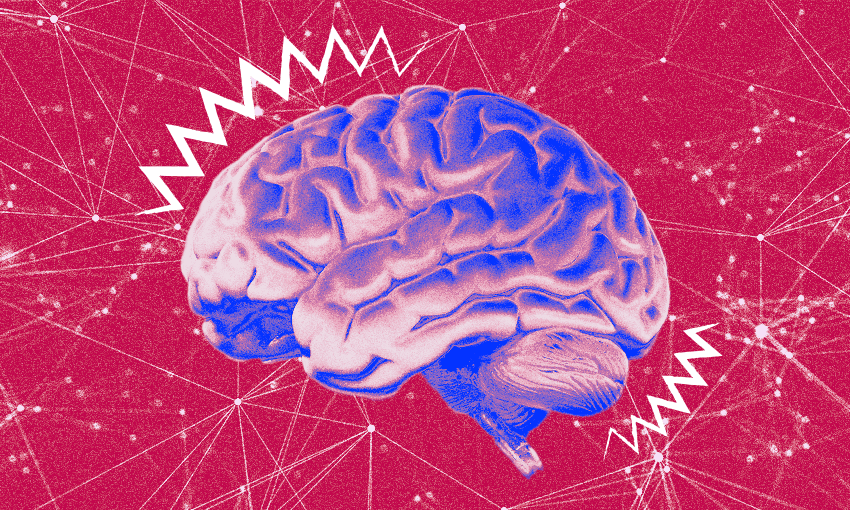When brain drink Ārepa was being formulated, the team needed someone with the expertise to ensure their product was making a real, positive impact on the brain. Neuroscientist Andrew Scholey was that person.
Professor Andrew Scholey is an expert on the effects of food and plants on brain health, having worked as a professor of human psychopharmacology in the UK and Australia. He has spent his career looking at how the chemical components of the food we ingest interact with our brains, in ways both positive and negative, and has produced numerous pieces of in-depth research on the subject.
To create the world’s smartest drink, Ārepa needed the world’s smartest people on board, and so Scholey was shoulder-tapped. His expertise proved crucial in developing a formula for the drink that would have meaningful and measurable cognitive impacts. In 2021, Scholey teamed up with Ārepa in a more official capacity and took up the role of chief science officer. His oversight ensures the company’s ongoing clinical studies are delivered at an internationally recognised level. Speaking from Melbourne, he explains the science behind Ārepa and what you might gain by enjoying a drink made with neuroberries rather than coffee beans.
This interview has been edited for clarity and length.
What’s your academic background, and why have you decided to focus on human psychopharmacology?
My background is in cognitive enhancement, particularly in nutrition and natural products that may have the potential to improve mood and cognitive function. Part of the reason why this interests me is that when we think about the cognitive decline that occurs with ageing in some people and leads to dementia, the pharmaceutical approach to this point has really not worked. And at the same time, there’s growing evidence that there are certain lifestyle factors like diet and exercise which can help protect the brain and improve mental health. So that’s been my main area of research for something like 30 years.
How did you end up working with Ārepa?
Basically, I helped them formulate their drink a few years ago. More recently, when Angus [Brown, co-founder of Ārepa] became aware I was leaving academia, he asked if I was interested in joining the company as its chief science officer. I get approached a lot by industry partners to help them design experiments and test whether their products have potential, and I’ve also been invited by a lot of companies to join their advisory boards as chief science officer, but I’ve always turned these offers down because they always seem to be driven more by marketing than evidence. But because Ārepa is very committed to the science and not overstating what the science shows, it wasn’t a difficult decision for me to accept. That was about two years ago now and I’m very happy to have done that.
The core ingredients in that original Ārepa formula are still the basis for Ārepa’s products today. One of these ingredients – and seemingly the most prominent – is something called a “neuroberry”. What is that?
The hero ingredient used in Ārepa is this New Zealand blackcurrant – also known as the neuroberry – which is really impressive in terms of improving mental alertness, or what we call attentional processes. They’re loaded with anthocyanins – part of a larger class of flavonoids, the components of fruit and vegetables that give them their bright colours – which are known to have a lot of health-promoting benefits. They’re generally very good for cardiovascular health and, in short, what’s good for the heart is generally good for the brain. They’re also loaded with vitamin C, which is very good for mental function.
They’ve also been shown to increase the levels of a class of neurotransmitters, including ones that people have probably heard of like dopamine and serotonin. These are involved in enhancing mood, but also in things like working memory and attentional processes. There have been studies where the blood of people who had eaten the berries showed monoamine oxidase inhibition, which basically means it prevents the breakdown of dopamine, serotonin and other neurotransmitters.
What about Ārepa’s other core ingredients?
L-theanine is commonly found in green tea, and what’s quite interesting is that people talk about tea as being both alerting and relaxing. These effects sound like they should be opposites, but they can actually make you feel refreshed and help to put you in what some people call a “flow state”. There’s some good evidence suggesting L-theanine has that effect.
The other ingredient, pine-bark extract, has a longer term effect. The brain is extremely energetic, so it’s constantly burning away 20-25 percent of the energy in your body even though it’s only about two percent of your body weight. That comes at a bit of a cost, meaning that the brain is susceptible to oxidative stress, which is a byproduct of these processes. One thing that protects against oxidative stress is antioxidants, and there’s evidence that certain extracts of pine-tree bark have these antioxidant properties. There’s one called enzogenol, which comes from New Zealand pines, which Ārepa uses and which has been shown to improve things like working memory in the long term.
It’s important these ingredients all complement each other because there isn’t a one-to-one correspondence between one particular function – like memory or focus – and your cognitive performance. You can’t just increase one neurotransmitter because the brain is very delicately balanced. There are all of these different processes that can impact cognitive function and it might be different for different people as well. But if you’ve got a substance that has a broad range of effects on those different processes, you’ve got a good chance of improving mood and cognitive function.
Part of your role is overseeing some of the clinical trials Ārepa is conducting. Can you tell me what some of those clinical trials are about?
Several of these trials are looking at the effects of Ārepa on various aspects of mental function, with one looking specifically at stress. There are different types of stress, like social stress and workload stress, with the trial currently underway looking at workload stress. The study involves bringing people into the lab to do multitasking brain work, simultaneously performing four cognitive tasks, which quite reliably makes people a little anxious and stressed. We predict Ārepa will help mitigate some of that.
There’s also some work going on with the University of Wollongong and the Dementia Centre for Research Collaboration, looking at something called the purple diet, with Ārepa included as part of that diet. Because purple foods are rich in anthocyanins, the study is looking at whether the purple diet can reduce the risk of dementia for people who are at high risk. This could be huge. Once we hit 60 or 70, the number of people getting dementia doubles every five years. If you can delay its onset by five years, you could potentially halve the number of people with dementia.
We also have several trials going on in New Zealand and Australia looking at longer term effects in different populations, including healthy adults and those with adult ADHD. We’re hoping to do some brain-imaging studies to better understand which brain systems are involved in the improvement that Ārepa causes. There’s a lot of very active research at the moment, and obviously I’m very excited to see those results come in.
Professor Andrew Scholey is a neuroscientist specialising in human psychopharmacology with appointments at Monash and Swinburne universities. He has spent nearly three decades researching the ways in which components of diet, drugs, food, alcohol and nutritional supplements influence the brain and behaviour.
His current work focuses on translating research findings into evidence-based claims for brain health for consumers, including as Chief Scientific Officer at Ārepa Nootropics.


